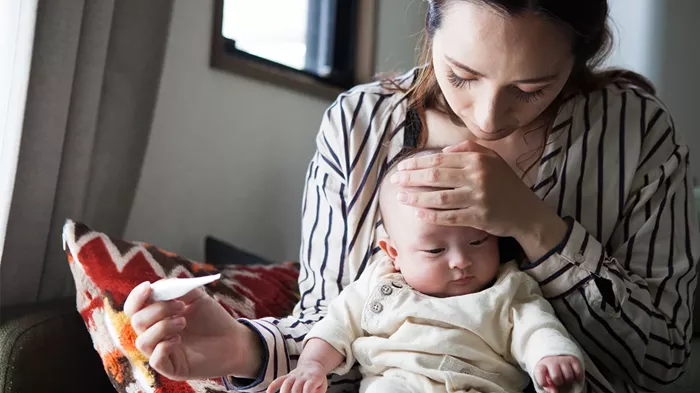Seeing your 9-month-old baby suffer from a cold can be distressing for any parent. Colds are a common occurrence in infants, with most babies experiencing six to eight colds during their first year of life. While colds are usually mild and resolve on their own, it’s essential to know how to manage your baby’s symptoms and when to seek medical attention. In this article, we will provide you with practical tips and guidance on caring for your 9-month-old baby with a cold.
1. Understanding Colds in Babies
Causes of Colds
Colds are caused by viruses and are highly contagious. Babies can catch colds from contact with infected people or surfaces. Colds are more common during the fall and winter months, but babies can get them year-round.
Symptoms of Colds in Babies
The most common symptoms of a cold in a 9-month-old baby include:
Runny or stuffy nose
Sneezing
Coughing
Mild fever
Decreased appetite
Irritability
Difficulty sleeping
2. Managing Cold Symptoms
Keeping Your Baby Hydrated
Ensuring your baby stays hydrated is crucial when they have a cold. Offer them breast milk or formula more frequently, and consider giving them small amounts of water if they are over 6 months old. Keep an eye on their urine output to ensure they are getting enough fluids.
Clearing Nasal Congestion
Nasal congestion can make it difficult for your baby to breathe and feed. Use a saline nasal spray or drops to loosen mucus, and then use a bulb syringe or nasal aspirator to gently suction out the mucus. Avoid using cotton swabs or other objects to clean your baby’s nose, as this can damage the delicate nasal tissues.
Using a Humidifier
Running a cool-mist humidifier in your baby’s room can help keep the air moist, which can ease their breathing and loosen mucus. Be sure to clean the humidifier regularly to prevent the growth of bacteria and mold.
Providing Comfort
Your baby may be fussy and uncomfortable due to their cold symptoms. Hold them close, rock them gently, and sing or read to them to provide comfort and distraction. You can also give them a warm bath to help relieve congestion and soothe their skin if it becomes irritated from nasal discharge.
See also: What Can You Give A Newborn For A Cold?S
3. When to Seek Medical Attention
While most colds in babies resolve on their own within 7-10 days, there are some instances when you should contact your pediatrician:
Your baby is under 3 months old and has a fever of 100.4°F (38°C) or higher
Your baby is 3-6 months old and has a fever of 101°F (38.3°C) or higher
Your baby is having difficulty breathing or is breathing rapidly
Your baby is not eating or drinking well
Your baby is unusually sleepy or irritable
Your baby’s symptoms last more than 10 days or worsen instead of improving
In these cases, your pediatrician may want to examine your baby to rule out more serious illnesses or complications, such as an ear infection or pneumonia.
4. Preventing the Spread of Colds
To help prevent the spread of colds to your baby and other family members, practice good hygiene habits:
Wash your hands frequently with soap and water, especially before feeding or touching your baby
Avoid close contact with people who are sick
Cover your mouth and nose when coughing or sneezing, and encourage others to do the same
Clean and disinfect frequently touched surfaces, such as toys and doorknobs
FAQs
Can I give my baby over-the-counter cold medicine?
No, over-the-counter cold medicines are not recommended for babies under 2 years old. These medications can have serious side effects and are not effective for treating cold symptoms in infants.
How long do colds last in babies?
Most colds in babies resolve within 7-10 days. However, some babies may have symptoms for up to 2 weeks. If your baby’s symptoms last more than 10 days or worsen instead of improving, contact your pediatrician.
Can I breastfeed my baby if I have a cold?
Yes, you can continue breastfeeding your baby if you have a cold. Breast milk contains antibodies that can help boost your baby’s immune system and protect them from getting sick. However, be sure to wash your hands frequently and avoid coughing or sneezing directly on your baby.
Conclusion
Caring for a 9-month-old baby with a cold can be challenging, but with the right strategies and support, you can help your little one feel better. Remember to keep them hydrated, clear their nasal congestion, and provide comfort. If you have any concerns or your baby’s symptoms worsen, don’t hesitate to contact your pediatrician. With time and rest, most babies recover from colds without any complications.
Related topics:
Remedies for Soothing a 19-Month-Old’s Cold Symptoms
What Are The Stages Of A Chest Cold In Children?
What to Give a 6-Month-Old with a Cold?


